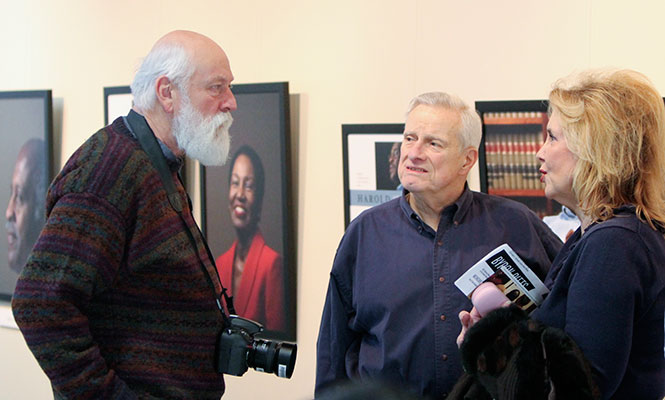New exhibit in Franklin Hall presents a story of integration
KRISTI R. GARABRANDT | DAILY KENT STATER Kent State Alumni George and Rebecca Zurava speak to JMC professor David LaBelle about Civil Rights at the “They Led the Way” exhibit at First Energy Auditorium in Franklin Hall, Thursday, Feb. 13, 2014.
February 14, 2014
Success despite adversity echoed through First Energy Auditorium in Franklin Hall as Professor Ann Schierhorn presented her sabbatical exhibit ‘They Led The Way.’
The photo exhibit, which featured Schierhorn’s research and lecturer Dave LaBelle’s photography, detailed the lives of the eight students who desegregated schools in Leon County, Fla., in the 1960s and was opened in Franklin Hall on Thursday. The exhibit was supposed to open on January 27, but was delayed with campus being closed because of the weather.
Schierhorn told the audience that this was a story close to her heart. She said there was a story not being told when desegregation was happening in the 1960s and she wanted to tell it, even after 40 years.
“I came back to [this story] because I wanted to recognize the pioneers; I wanted to tell how it turned out,” Schierhorn said. “I hadn’t seen them for more than 40 years and I wanted their sacrifice to be understood by students today.”
Along with Schierhorn’s remarks about each individual she worked with, LaBelle spoke of his experiences photographing and getting to know them. He said he went from having to photograph Keith Neyland quickly in an airport to asking Harold Knowles questions he had never thought about before. There was also a video shown of Mahlon C. Rhaney Jr., who was set to speak at the original Kent State premiere, expressing his feelings on the exhibit and its effects.
“The main thing that I would want anyone to take from this exhibit, especially students, is that you can overcome adversity if you’re determined to do,” Rhaney said in the video. “Don’t let other people tell you what it is that you can do.”
Audience members said the exhibit was inspiring and a way to keep people still engaged with history. English lecturer Denise Harrison shared her own story of desegregation during the question and answer period of the presentation. She said that this project was an excellent way of keeping history relevant and not just in a textbook.
“I think the biggest thing I take away is that with all the struggles that they had, each person gives young people today a kernel of truth that they can live by,” she said. “They’re not dwelling in the past, but it does shape them.”
The theme of success, in both the leaders of the past and leaders of the future, was also present throughout the presentation.
“Because they were successful they became teachers and helped students, they became parents, they became grandparents, they became civic leaders because they were successful,” LaBelle said. “So there’s great value in you succeeding and staying on course and shutting out all those voices who say you can’t do it.”
Contact Heather Inglis at [email protected].












